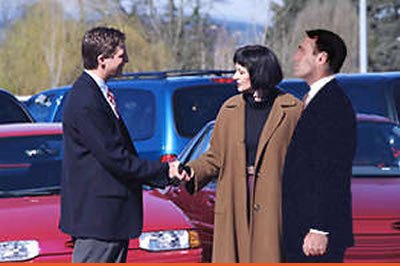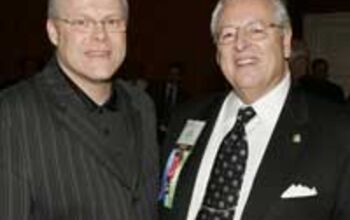NADA Chief to Detroit: It Wazzunt Us
The Chairman of the National Automobile Dealers Association (NADA) doesn't believe "overdealering" should take the rap for Detroit's woes. In an editorial posted on NADA.org and published without comment in Automotive News, Dale Wiley attempts to refute a Detroit Free Press article claiming that a glut of franchisees costs The Big 2.8 some $4b a year. [NB: The article in question has mysteriously disappeared from the newspaper's website.] Rather than address the big picture, Wiley (both by name and by nature) hones-in on the Freep's assertion that the Bigs pick-up the cost of sending vehicles to dealer parking lots. Nit picked and any discussion of actual dealer numbers ignored (GM has some 7100 U.S. dealers while Toyota somehow "makes do" with about 1600), Wiley poses the "real" question. "Will the Detroit 3 will drastically lose market share if they drastically reduce the number of their dealers?" Good question, even if it mistakes cause for effect. Shame the NADA boss doesn't answer it. But we do learn that "research at GM found that a dealership only needs to sell 10 new vehicles a year to pay for the cost of supporting that dealership." Huh? Anyway, here's Wiley's bottom line: "Anti-trust laws impose restrictions on trade associations advocating actions that would reduce competition, so it is inappropriate for NADA to take sides in the debate over dealer numbers." Wink, wink.
More by Robert Farago


































Comments
Join the conversation
When Detroit Iron controlled over 50% of the North American market, it made sense for them to have dealers all over the place, just like there were gas stations all over the place. At that time no one could own more than 1 dealership, and the dealer pricipal/owner was working full time in the dealership. Things have changed a a few times over. Manufacturers are no longer interested in having "mom amd pop" dealers, or dealers that are in poor facilities it affects the branding. As things change, most people do their initial information gathering, and shopping online from their home or office, the actual dealership for new vehicle shopping is on a PC. The progression from PC to actual "brick and mortar" dealer is usually an "acceptable" experience. The customer is not WoWed, often its a process that must be endured to complete a transaction and take delivery of a vehicle. There is limited profitability remaining in new vehicle sales that dealers to support the "glass palaces" need to resort to a variety of other activities to raise the profit and level of customer discontent. When manufacturers, and dealers finally put on their "customer shoes" and relive an entire ownership experience they might start effecting compelling changes that will make a difference. Usually manufacturers and dealers continue their "adversarial dance" and the customer is caught in the middle.
Yes, I completely understand the franchise concept and the manufacturers limitations therein. See the last sentence of my post. However, I have to wonder if the Chinese will be looking for franchise dealerships when they get here in a few years. My guess is that they will set up a central distributorship which will then own the dealerships. AGR's premise that the buying experience is changing (which I agree with) does not bode well for domestic brands who are still struggling to make class competitive vehicles for 1998, much less 2008. They're traditionally quite slow on the uptake, and their market share reflects it. The new car sales model will change. It has to. Manufacturers don't trust the dealers, and visa versa. And the manufacturers (especially the domestics) have the most to lose by continuing status quo. They know that the dealers are negatively affecting the customer experience. So, how do we get there from here? I don't know. As a previous poster mentioned, there are copious state franchise laws in place to protect the dealer base. But the long and short of it is that long term, you can't FORCE somebody to continue to sell you a product. The margins and/or availabilities will continue to become smaller and smaller until it ceases to become cost effective to be a new car retailer.